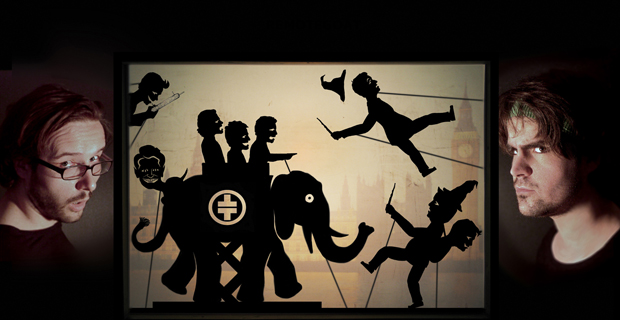Showing @ Traverse Theatre, Edinburgh, Sat 4 Feb only
The James Camerons of this world try (and commercially succeed) to seduce audiences with majestic panoramas through pioneering and expensive techniques. But what’s the point of spectacular visuals, if the script doesn’t match the cinematography? Jeremy Bidgood and Lewis Young instead rely on the simplicity of shadow puppetry and a script that deftly blends popular culture and politics, creating satire with more bite than a pool of hungry piranhas.
A compilation of relentlessly witty scenes, repeated characters like David Cameron: The Boy Who Lived (in a mansion), GrammarCop and Brian Cox, give this chaotically performed mélange some semblance of a story line. However, with the continual appearance of freshly lampooned personalities there’s little worry over the wavering narrative.
Returning to Edinburgh after great success at 2011’s Fringe, the pair astutely weave together last year’s larger stories like phone hacking, the riots and that now almost clichéd target of parody, the recession, with an innovative and eccentric approach that sees boybands as the cause of the economic collapse. Mercilessly fast-paced, the performers’ frenetic energy infectiously spreads to the audience, as they ungraciously sling expired characters behind them before grasping another painstakingly crafted figure. The elaborate puppets are joined by an ever-changing background, projected onto the puppetry screen, contextualising the characters and adding another comical device that brings some colour to the silhouetted action.
There are some questionable accents (though Young’s Cox is admirable) as in the case of the all-Irish Take That, but these only assist in the suspension of reality already created by the hilarious observations of contemporary culture. When the eye does waver from the dancing shadows, it falls upon the contorted expressions of either performer, as rather than hide behind the screen, they acknowledge their existence by embodying the characters they’re recreating. Despite embracing a genre stereotypically seen as for children, by combining it with caricatured social commentary, they transcend all generations in a joyously playful and roguish demonstration of puppetry.
